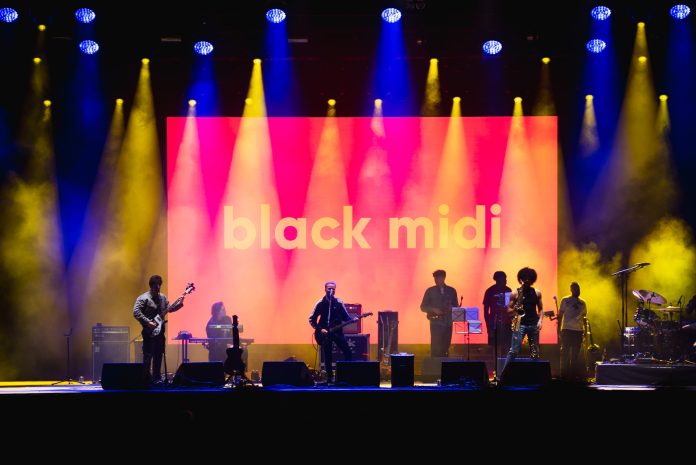Jasper Kerr
Contributing Writer
“Moving with a purpose,” London experimental rock band, black midi (stylized in lowercase), has once again caused a stir in the underground with the third installment of their fantastically cacophonous brand of post-punk. black midi’s first two records, Schlaganheim (2019) and Cavalcade (2021) have already cemented the trio as one of the most exciting, unique, and utterly chaotic rock bands to occupy a space anywhere near the mainstream since Primus, a clear influence on the band’s sound. Hellfire shows the band branching out and increasing their experimentation; however, it is also black midi’s most cohesive effort yet. Well, as “cohesive” as an album that combines cabaret spoken word, dreamy country ballads, psycho-jazz rants, and military-critiquing funk-rock can be.
The aptly named title track begins with what sounds to be a death march down into the depths of black midi’s zany, twisted universe. Lead singer Geordie Greep (and yes, that is actually his name), delivers an abstract, staccato attack of absurdist statements above an anxiety-inducing vaudeville swing that truly sounds as if we are entering some kind of hell — or perhaps one of cartoonishly sinister variety.
With a ding, “Sugar/Tzu” kicks off our first true narrative of the record: an account of a boxing match, the “Leadweight clash of the century.” Taking place in the year 2163, the match is recounted in first person by a self-described “three foot-three superfluous freak.” Not many bands could get away with such ridiculous storytelling and yet, Greep and company do so with ease, matching the insanity of the tale with neck-breaking jazzy arpeggios and playing with as much prowess as any talented professional jazz musician. The athletic theme of this track makes more sense than it initially seems; each member of black midi’s performance on this whole album can be likened to a sport, their rehearsals most likely genuine workouts.
On the following track, “Eat Men Eat,” bassist Cameron Picton takes over vocal duties, his expressive descriptions of a captain giving his crew food poisoning carrying this whiplash of a song. It’s hard not to crack a smile at how absurd both the story and the sincerity of Picton’s delivery are juxtaposed here, and he shows himself to be a worthy frontman in his own right.
“Welcome to Hell” sees Greep getting about as real as possible on such a removed record with some genuine critiques of the harshness of the military present under what is, of course, another far-fetched narrative told from the point of view of a sadistic drill sergeant.
“To die for your country does not win a war / to kill for your country is what wins a war,” and “in this land of oysters, you are the worm” are two standout lines, using absurdity to underline the quite real horrors of the military.
With a country twang, “Still” lives up to its name as being the softest and slowest cut on the album, even containing some airy lap steels and soft jazz horns. It, along with a brief interlude, sets us up for the biggest, most punishing song on the record: “The Race is About to Begin.” And a race it certainly is. Greep’s rapid-fire detailing of a day at the horse tracks leave you feeling as if you need to catch your breath, and angular, indigestible guitar riffs compliment the paranoid narrative that the song exudes. I can’t imagine comprehending this song without reading along with the lyrics, which still is not an easy feat. Greep’s descriptions are thematically reminiscent of the acid-washed writings of Hunter S. Thompson, emanating a similar sense of absurdist paranoia concerning the darkness of modernity: “the hack becomes a master / the crass becomes divine / the infinite, infinitesimal / all sins irrepressible.”
Hellfire is a thoroughly entertaining listen, yet parts of it can certainly be difficult to stomach, especially if one is not used to black midi’s sound (depending on one’s own musical tastes.) The record is also slightly front-loaded and can occasionally be too absurd for its own good. Nevertheless, black midi remains one of the most originally captivating bands of the modern era, and Hellfire is surely in the running for the most interesting album of the year — if not most technically impressive, for both its arduous instrumentation and imaginative, first-person literary narratives. It is the sort of album that is either loved or hated, both with an equally justifiable personal reason. However, there is no denying its artistic merit and impressively ambitious creative experimentation. This record is brave and wholly original — a rarity in modern popular music — and black midi is certainly worthy of due praise for the absurd, jazzy, uniquely weird cacophony that is Hellfire.











